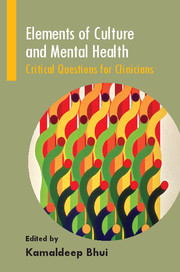Book contents
- Frontmatter
- Contents
- List of contributors
- Foreword: Desire and commitment: essential ingredients in learning about culture and mental illness
- 1 Is trauma-focused therapy helpful for survivors of war and conflict?
- 2 Will ethnopsychopharmacology lead to changes in clinical practice?
- 3 Does cognitive–behavioural therapy work for people with very different cultural orientations and backgrounds?
- 4 Can you do meaningful cognitive–behavioural therapy through an interpreter?
- 5 Are particular psychotherapeutic orientations indicated with specific ethnic minority groups?
- 6 Can psychotherapeutic interventions overcome epistemic difference?
- 7 On the role of culture and difference in evaluation, assessment and diagnosis
- 8 Necessary and sufficient competencies for intercultural work
- 9 On the validity and usefulness of existing Eurocentric diagnostic categories
- 10 Benefits and limitations of the cultural formulation in intercultural work
- 11 Barriers to the intercultural therapeutic relationship and how to overcome them
- 12 How does intercultural interpretation work in the mental health setting?
- 13 Do the power relations inherent in medical systems help or hinder in cross-cultural psychiatry?
- 14 Recovery and well-being: a paradigm for care
- 15 Social perspectives on diagnosis
- 16 Public mental health and inequalities
- 17 Can you do psychotherapy through an interpreter?
- 18 Can race and racism be acknowledged in the transference without it becoming a source of therapeutic impasse?
- 19 Cultural competence: models, measures and movements
- 20 Religion, spirituality and mental health
- Index
15 - Social perspectives on diagnosis
Published online by Cambridge University Press: 01 January 2018
- Frontmatter
- Contents
- List of contributors
- Foreword: Desire and commitment: essential ingredients in learning about culture and mental illness
- 1 Is trauma-focused therapy helpful for survivors of war and conflict?
- 2 Will ethnopsychopharmacology lead to changes in clinical practice?
- 3 Does cognitive–behavioural therapy work for people with very different cultural orientations and backgrounds?
- 4 Can you do meaningful cognitive–behavioural therapy through an interpreter?
- 5 Are particular psychotherapeutic orientations indicated with specific ethnic minority groups?
- 6 Can psychotherapeutic interventions overcome epistemic difference?
- 7 On the role of culture and difference in evaluation, assessment and diagnosis
- 8 Necessary and sufficient competencies for intercultural work
- 9 On the validity and usefulness of existing Eurocentric diagnostic categories
- 10 Benefits and limitations of the cultural formulation in intercultural work
- 11 Barriers to the intercultural therapeutic relationship and how to overcome them
- 12 How does intercultural interpretation work in the mental health setting?
- 13 Do the power relations inherent in medical systems help or hinder in cross-cultural psychiatry?
- 14 Recovery and well-being: a paradigm for care
- 15 Social perspectives on diagnosis
- 16 Public mental health and inequalities
- 17 Can you do psychotherapy through an interpreter?
- 18 Can race and racism be acknowledged in the transference without it becoming a source of therapeutic impasse?
- 19 Cultural competence: models, measures and movements
- 20 Religion, spirituality and mental health
- Index
Summary
Modern Western psychology and psychiatry arose in the context of the European Enlightenment of the 17th and 18th centuries. In the early 19th century, only two main mental illnesses were usually recognised – mania and melancholia (Shorter, 1997). As various theories of mental functioning came on the scene, new diagnoses were constructed in Europe and North America and two key diagnostic systems, the International Classification of Diseases (ICD) and Diagnostic and Statistical Manual of Mental Disorders (DSM), were developed. These are revised from time to time by groups of psychiatrists mainly living in the West and usually strongly influenced by pressure groups, including pharmaceutical companies wishing to market new remedies for illnesses. The first DSM (American Psychiatric Association, 1952) contained 60 diagnoses; the current edition, DSMIV (American Psychiatric Association, 1994), lists 297; and DSM-5, to be published in 2013, is likely to have even more (American Psychiatric Association, 2010).
A few diagnoses have fallen by the wayside. For example, gone are several popularised in the southern states of the USA as peculiar to Black slaves, such as drapetomania, characterised by persistent running away from the plantations (Cartwright, 1851). Homosexuality was listed as an illness in the DSM until the seventh printing of DSM-IV in 1974 and in the ICD until ICD-10, published in 1990 (Shorter, 1997). Well into the 1960s, depression was reported as rare among Asian and African people and Black Americans, a rarity attributed to their supposed irresponsible nature (Green, 1914) and absence of a sense of responsibility (Carothers, 1953).
A multi-ethnic society includes people whose backgrounds are culturally diverse as well as people seen as different in terms of race. No psychiatric diagnosis has an established biological marker; hence, there is no way of proving objectively its accuracy or its validity as a measure of a biological reality applicable to all human beings. Kendell & Jablensky (2003) describe diagnostic categories as ‘simply concepts, justified only by whether they provide a useful framework for organizing and explaining the complexity of clinical experience in order to derive inferences about outcome and to guide decisions about treatment’. They warn against reifying a diagnosis by assuming that it is ‘an entity of some kind that can be evoked to explain the patient's symptoms and whose validity need not be questioned’.
- Type
- Chapter
- Information
- Elements of Culture and Mental HealthCritical Questions for Clinicians, pp. 69 - 72Publisher: Royal College of PsychiatristsPrint publication year: 2013



